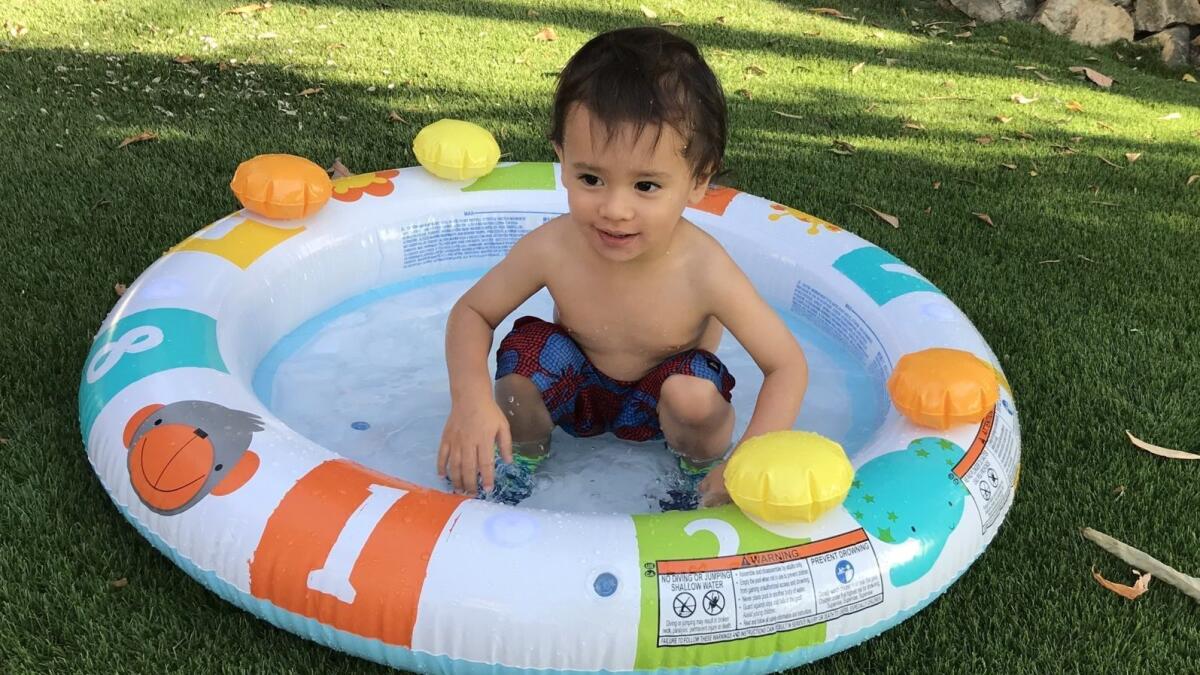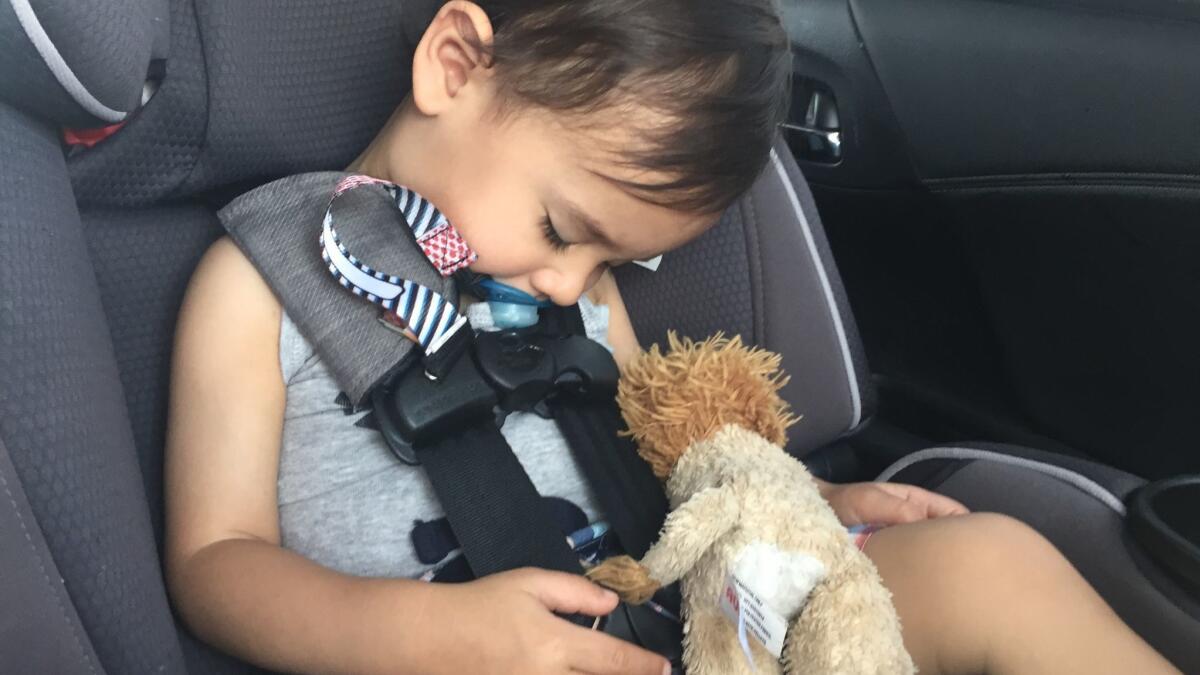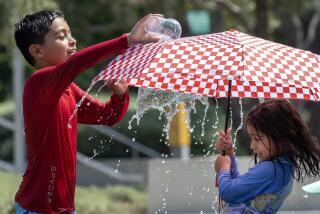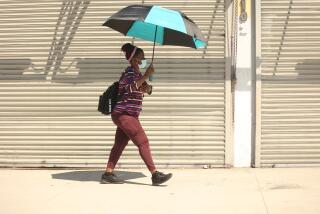Surviving a heat wave — with a toddler

- Share via
My husband Patrick and I were curled up on the couch watching TV late one recent Friday when the lights went out.
My first thought was that it was a bit romantic. Then Maxwell started to cry.
Thanks to the power failure, we couldn’t use the camera on the baby monitor to check on our 18-month-old son. I figured he was hot without the air conditioning; the whole day, the temperature had hovered around 76 degrees inside his room as the sun beat down on the house and the AC, going full blast, struggled to keep up with the triple-digit heat in northeastern Los Angeles.
It turned out that he was afraid of the dark and the quiet, something he’d never quite experienced, since he usually sleeps with a night light and a white noise maker.
We finally soothed him back to sleep, and as we got into bed, we figured our biggest problem would be all the noise our appliances and gadgets would make when they powered back on in the middle of the night.
But the temperature kept climbing, and our son kept waking up.
We slid a meat thermometer under his door to check just how hot it was. It was cooler in his room with the door shut than it was in the rest of the house, barely, and temperatures were hotter outside, so opening the windows wasn’t an option.
If you’re a parent, your heart might be racing just reading the previous sentence. Not to worry, this story has a happy ending, after roughly 44 hours and 38 minutes without power. If it happens again, we’ll be prepared.
Here are some tips for surviving the only thing worse than a heat wave with a toddler — a blackout during a heat wave with a toddler.
1. Know your local air conditioning
We somehow managed to sleep a few hours, expecting things surely would kick on any minute. By sunrise, with temperatures inside the house now in the 80s and the temperature outside creeping to 100 degrees, we called our favorite local breakfast spot to make sure it had working air conditioning.
The helped us kill 90 minutes. But here’s the thing about toddlers: They have a ton of energy and they tend to do better when you change it up throughout the day. That meant Lemon Poppy Kitchen in Glassell Park wouldn’t be the solution for the next meal. So it became a day on the go.
Next up was our neighborhood library. It’s air conditioned, and there is room to spread out. Unfortunately, when your kid is 18 months old, he or she might not understand the concept of “Shhhh…”
We quickly learned that Maxwell didn’t, and then he started throwing books. The librarian brought over some crayons, which he attempted to eat. Time to go.
2. Have lion, will travel
Toddlers need to nap, usually between two and three hours at midday. There was no way that would be possible in his crib in our hot and dark house.
Our answer was a nap on wheels. We ran into the house to collect a pacifier, his favorite stuffed animal (a lion named “Baby”) and an empty bottle. After a quick stop to buy milk, we were on the move.

As we snuggled him into the car seat with the air conditioning at a comfortable temperature, I was aware of how fortunate we were to have a tank full of gas and the financial security to not worry about burning it. Without a doubt, getting through the day would have been much harder without credit cards.
Maxwell managed to get close to a full nap as we ran errands while one of us waited in the running car, one of those situations that made me appreciate even more how difficult it must have been for my own single mom.
3. Safe spaces for roaming toddlers
As we’ve reported, some options for reliable air conditioning in a heat wave include museums, movie theaters or a Los Angeles County cooling center. (Find your nearest cooling center at lacounty.gov/heat.) Those are easier said than done when your kid likes to shout things like “poop!” and “doggle doggle!” while running around attempting to climb, push or destroy everything in sight.
The grocery store was an option for a brief period of time, until Maxwell tried to stand up in the cart.
The mall felt safe. Maxwell was excited by three-way mirrors in the changing rooms, and he loved being able to run for long stretches without having to worry about cars or wearing sunscreen. Lunchtime in the food court was a little chaotic. At least one argument broke out as people waited to claim tables, chairs and the coveted few high chairs.
We figured we’d spend at least an hour window shopping at the Glendale Galleria. Three hours, six stores and too much money later, Maxwell had learned how to say “Shopping!”
By this point, my Instagram story documenting our blackout drama had raised alarm bells with enough of our friends that we had offers to come hang out in their air conditioning.
It was time to check back on the house.
4. Decide what to grab and what to let go
Back home, we took out the meat thermometer again and watched the temperature climb inside the house as we gathered our stuff.
Here’s where we had to make some quick and difficult decisions. It wasn’t safe for Maxwell to roam around the sweltering house in the dark, so we popped him into a Pack ’n Play while we shoved things into bags.
Fashion and freshness had gone out the window hours earlier, so we grabbed baseball caps, something to sleep in and toothbrushes.
We got the blowup pool, more diapers and the travel bed. We had a cooler and ice to keep the milk cold. We didn’t dare open the fridge, but Patrick was insistent on salvaging the fancy steaks we had stored in the freezer. I tossed a handful of crackers, fruit and other things on the counters into a tote bag.
It was so hot inside the house that Maxwell’s hair was matted to his head.
5. Keeping the kid cool
If baths aren’t an option, figure out some sort of water solution. The inflatable pool was a decent one. We also have a spray bottle with a fan attachment.
Make sure your toddler is drinking enough water. The heat can make kids lethargic and forget to ask for what they need, so you might have to force it on him or her.
And there’s nothing wrong with your kid staying in just a diaper all day. If it’s that hot, do what you need to do.
We were lucky to have friends with air conditioning and a guest bedroom, and went about the next day much like the first, though most of our shopping was concentrated at Target. A second set of friends invited us to their place for Sunday night as the hours on the stopwatch I’d started when the power went out notched past 40.
6. Keep numbers handy
When the power first went out, we called the Los Angeles Department of Water and Power to report the outage. (Tip: Keep your account number saved somewhere, because you’ll need to enter it when you call.)
We continued to call to check for status updates and waited for a representative each time to let him or her know that we had a baby. On Day 3 of phone calls, I asked if people with young children were given any priority. The response: “Everybody is a high priority.”
7. Remain flexible
Children often are guided by routine. When the power is out, all bets are off. Maxwell’s nap time was off, we kept him out too late, and we let him snack all day to make sure he had enough energy.
Our friends bought us some milk, but it was the wrong kind. And you know what? It was just fine. Kids are adaptable.
8. Be tech savvy
Keep battery packs and light sources — such as solar-powered lanterns and flashlights — charged and at the ready in the house. (Candles are a no-no, especially around kids and in high heat.)
We embrace technology so we didn’t need to wait for the LADWP to let us know when the power kicked on, thanks to mobile push alerts from the front door camera, the thermostat and the baby monitor.
Finally, if it weren’t for my social media posts, our friends wouldn’t have known we could use some help. So don’t be shy about asking for help when you’re in need.
christina.bellantoni@latimes.com
ALSO
How to keep children, seniors, pets — and yourself — cool this summer



